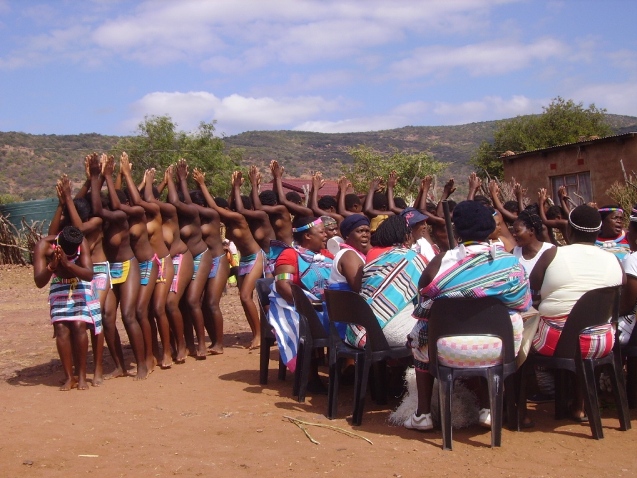Dancing is an important part of Venda culture and the frequency of performances depends to a great extent on the season and economic wealth. If the countryside resounds with music, especially at night when it is cool, it is a sign of good times. Venda music and dance is not a substitute for happiness, but an expression of it.

Dancing is sponsored by rulers, and they will send their dancers to other rulers, either to confirm their relationship or, if he is a chief and they are headmen, to exact tribute.
Venda Culture: Domba Dance
The most famous of the Venda dances is the Domba, or python dance which is held annually at one of their most sacred sites, Lake Fundudzi to secure good rains for the following season. Young maidens, as the final stage of their initiation into womanhood, line up in single file forming a chain and dance in long fluidly, winding lines, like a snake. Traditionally the dancers wear small aprons covering the back and front, with tasselled ornaments called thahu.

Another famous dance is a royal dance called the Tshikona, which can be considered as the Venda "national dance. Traditionally it is a male dance performed at funerals, wedding or religious ceremonies. Each dancer has a pipe which is made out of a special indigenous type of bamboo and has only one note and they blow it in at a specific time so as to build a melody with the other pipes.
During planting and weeding only important ritual music and work-songs are performed regularly. However, when the first green maize cobs are appearing, girls perform the festive dances, tshigombela and tshifhasi. The tshigombela is usually performed by married women whilst the tshifhasi is very similar but performed by young unmarried girls (khomba).
Circumcision schools are held during the winter, and possession dances and boys' communal dances take place chiefly during the period of rest between harvest and planting.
Venda Culture: Drums
Drums are often given personal names and are always played by women and girls, except in possession dances, when men may play them.
Drums form an important part of Venda culture and there are legends and symbols linked to them. Most sets of drums are kept in the homes of chiefs and headmen, and comprise one ngoma, one thungwa, and 2 or 3 murumba.
Learn More About The Venda Culture
Venda People
Mashovhela Rock Pool
Water In The Venda Culture
Venda Traditional Dress
Lake Fundudzi
|
